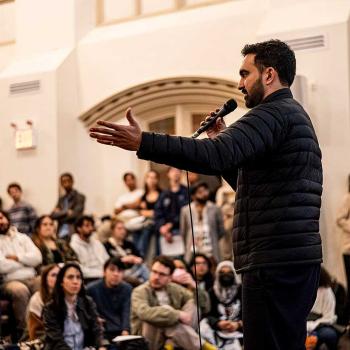Thomas Aquinas offered five proofs of God's existence. Anselm of Canterbury offered one. There is general agreement that these proofs aren't logically persuasive: one can agree with the premises of the arguments without agreeing with their conclusion.
But a reading of what either of those thinkers actually said shows that they were not trying to give a proof that no one could rationally deny. Aquinas tells us that he is going to explain the five ways in which people speak of God. Anselm offers his supposed proof as part of a prayer, making us suspect that it isn't a proof of the kind that we expect. Rather than six possible proofs of God's existence, we turn out to have none.
But as philosophers from Augustine to Marion have pointed out, God is not so much an object of thought to be proven or disproven, something to be thought about, one object among many others. Rather, he is a person to be adored, praised, and loved. To use the language of Buber and Levinas, he is a You rather than an It. He is someone we love.
As is true of any beloved, when I speak of God in the third person (as I do here), I am no longer relating to him as someone who loves him. I can speak of Janice as "the woman to whom I am married," "five foot two inches tall," "blonde," and so on. But when I do I have separated myself from her and taken the position, not of her lover, but of merely an observer.
What I say from that position may be true, but it falsifies my relationship to her. The claim she has on me as my beloved is undermined by the distance I take from her. In the same way, to insist on relating to God in the third person is to take a distance from him that undermines the very relationship I want and need.
God does not expect proofs of his existence, and lovers of God do not offer them and remain lovers. Yet he asks us to prove him! In Malachi 3:10, when speaking of tithing, he says "prove me now herewith . . . if I will not open you the windows of heaven, and pour you out a blessing that there shall not be room enough to receive it."
And the psalmist prays that God will prove him: "Examine me, O Lord, and prove me: try my reins and heart" (Ps. 26:2). In this love relationship, proof goes both ways, but it isn't logical proof.
The proofs of God come in the life of love. I test him and his word, seeing whether the life of loving God is a blessing. I prove him by living the life he offers, gifted life by the Spirit: "I exhort you, my brethren, that ye deny not the gifts of God, for they are many; . . . and they are given by the manifestations of the Spirit of God unto men, to profit them." (Moro. 10:8)
The proof of God is found in the spiritual profit that his gifts bring to my life and the lives of those whom I love, whether they are close to me or distant.
Yet the same life tests me to see whether I am really a lover or merely someone who plays at it, pretending to love, perhaps even to myself. Is my life one of love and grace, or am I bound by a law that I self-deceptively impute to God, a law that constrains me from love rather than one that liberates me to it?
The real question is not whether God will be adequate to proof, but whether I will.
12/2/2022 9:09:21 PM





